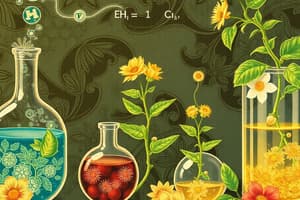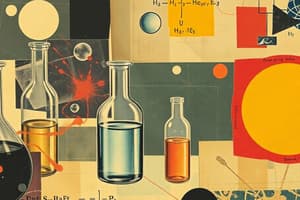Podcast
Questions and Answers
What is a coefficient in a balanced chemical equation?
What is a coefficient in a balanced chemical equation?
- The energy released in a reaction
- A measure of temperature
- A small whole number in front of a formula (correct)
- The total mass of reactants
What type of reaction involves an element or compound reacting with oxygen?
What type of reaction involves an element or compound reacting with oxygen?
- Synthesis reaction
- Combustion reaction (correct)
- Decomposition reaction
- Displacement reaction
What is the purpose of a concave mirror in optics?
What is the purpose of a concave mirror in optics?
- To diverge light rays
- To reflect light rays at random angles
- To scatter light across a large area
- To focus parallel light rays to a common point (correct)
How is concentration usually expressed in chemistry?
How is concentration usually expressed in chemistry?
What occurs during constructive interference of waves?
What occurs during constructive interference of waves?
What shape characterizes a converging lens?
What shape characterizes a converging lens?
What defines the crest of a wave?
What defines the crest of a wave?
What is the critical angle in optics?
What is the critical angle in optics?
Flashcards are hidden until you start studying
Study Notes
Key Terminology in Chemistry and Physics
-
Coefficient: A small whole number in front of a formula in balanced chemical equations, indicating the number of moles or molecules involved in the reaction.
-
Combustion Reaction: A type of chemical reaction where an element or compound reacts with oxygen, producing heat and light energy.
-
Compression: The point in a medium where a longitudinal wave has maximum density, contributing to the propagation of sound waves.
Optical and Wave Properties
-
Concave Mirror: Reflective surface that curves inward, focusing parallel light rays to a common focal point located in front of the mirror.
-
Concentration: A measure of the amount of solute dissolved in a solvent, commonly expressed in moles per liter (mol/L), important for determining the strength of solutions.
-
Constructive Interference: Occurs when two waves in a medium interfere in the same direction, resulting in an increase in wave amplitude.
-
Converging Lens: Thicker at the center than at the edges, this type of lens refracts parallel rays of light towards a single focal point.
-
Convex Mirror: Reflective surface that curves outward, causing parallel light rays to diverge from a focal point that appears to be located behind the mirror.
-
Crest of a Wave: The highest point on a wave, representing the maximum positive displacement from its rest position.
-
Critical Angle: The specific angle of incidence at which the angle of refraction equals 90°, relevant in understanding light behavior between different media.
Studying That Suits You
Use AI to generate personalized quizzes and flashcards to suit your learning preferences.




